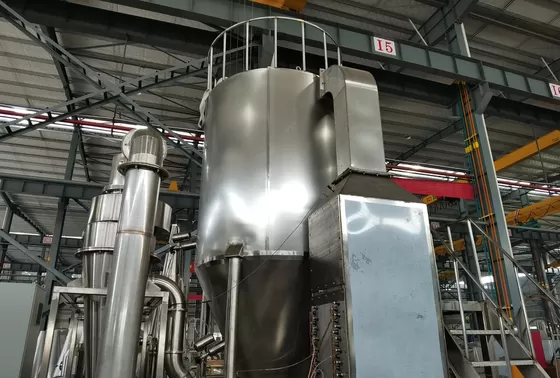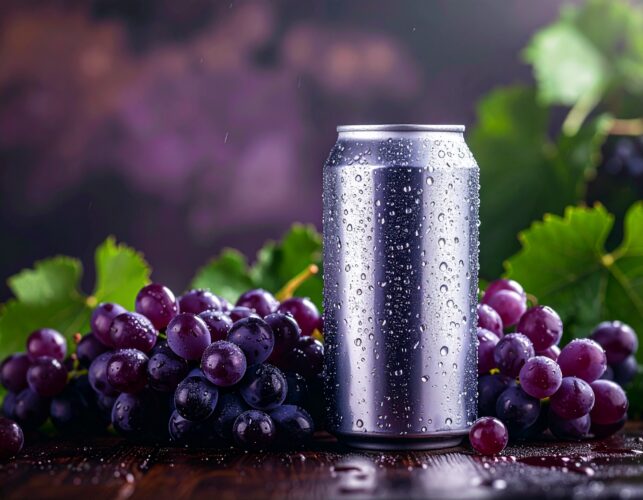
How to operate spray drying and kosher productions in confluence.
By Ilana Klein, with contributions by Rabbi Elisha Rubin.
Spray-drying is a process by which liquid or semi-liquid substances are sprayed in a heated tower order to dry them. It leaves behind dry particulate, usually resulting in a powdered product. Consumers or companies may buy either retail or supply chain products in powdered or crystalized form. They’re often intended to be reconstituted into either a liquid or hydrated state, or be incorporated into dry applications of a finished product. In either scenario, it’s likely that these products have undergone a spray drying process.
As you well know, kosher certification is simply essential in several sectors of food and beverage. More and more product categories are seeing the need to add kosher to their roster of certifications to promote ideal retail placement. But being that kosher certification is such an equipment- and location-focused program, you may be wondering what sort of impact kosher has on a spray drying program. Or, you may be curious as to how introducing a spray-dry process and facility into an already-kosher certified production would work, and what to consider.
To answer these questions and clarify the unknown, we’re here to help.
The Significance of a Kosher Certification
Why would you need kosher?
Kosher certification not only allows for religious consumers to access your company’s products. A reputable kosher trademark, or symbol, on a product label also signals several consumer types that the product at hand is of high quality, well regulated and safe to consume. To manufacturing customers, a valid OK Kosher certificate verifies that the end product will satisfy their customer’s regulatory requirement for kosher.
What’s entailed in a kosher program?
At the facility level, kosher is also one of the most detailed types of certification programs out there. It addresses production on the raw material and equipment levels. In addition, kosher inspections require visual verification, by in-person inspection, that ingredients on-site match their corresponding documentation. And given the need for some facilities and equipment to undergo “kosherization,” it’s also a physically involved type of certification.
What can we expect with kosher certification?
Kosherization is just one aspect of kosher certification programs. We use this method of high-heat cleaning on certain equipment between runs. This ensures complete segregation of dairy-containing or dairy-derived ingredients from meat- or poultry-containing or derived ones. We also consider production of “Pareve,” or neutral, items which neither contain nor are derived from either of the above two categories of foods. Finally, certain equipment used for non-kosher production necessitates kosherization as well before using it for kosher production. These procedures, in addition to a thorough ingredient screening, make up the key criteria for a kosher program.
What Types of Products Are Spray Dried?
Some of the world’s most popular food categories use spray drying as part of their production. Liquids have a shorter shelf life than powders due to their ability to house microbes that cause spoilage. Hence the creation of so many shelf-stable products from naturally liquid ones. Some common examples are powdered gravy, sauces, soup and seasoning mixes, yeast, milk, whey creamer, baby formula and eggs. Similarly, instant foods and drinks like pudding, tea, agglomerated and granulated coffee, lemonade and hot chocolate are produced by spray drying. Powdered flavors and colorings, extracts or fruits and vegetables also under go this processing method.
Flavors, fragrances and chemicals used in the industry also undergo spray drying. For liquid end products, a liquid flavor will work. However, when the final product will be dry, the flavor or other additive needs to be dry in order to incorporated without clumping. Creating a powdered substance can improve handling procedures, since some chemicals in their liquid form can be toxic, or be skin or eye irritants.
Technical Aspects of Spray Drying Facilities – How they Run
Dedicated spray drying facilities serve clients from small producers to larger brands, though some very large companies have their own spray drying equipment. The actual spray dryer machines are typically between two and four stories tall, and anywhere from 10 to 21 feet in diameter. Pilot dryers, a smaller type of spray dryer, may be as small as 6 feet tall and 3 feet in diameter. A full-sized spray dryer will process up to 600 pounds of powder per hour, while a pilot dryer may only produce 6 pounds per day.
Put simply, a spray dryer converts a liquid product into a powder. The technical process usually involves mixing the product (flavor, color, additive, etc.) with a starch in an emulsion tank. The machine then heats the mixture to create that emulsion. The dryer heats to around 400 degrees, Fahrenheit (though the exact temperature depends on the product undergoing drying). The emulsion then pumps up to the top of the spray dryer and through a nozzle, usually an atomizer. This rotates at around 20,000 RPM, and can do so up to 70,000 RPM, to disperse the product back down into the dryer.
Some spray dryers use high pressure nozzles that don’t rotate, however. The sprayed liquid product dries as it drops to the bottom of the tank, sometimes hitting the walls of the dryer as it drops down (usually leaving behind a significant amount of product caked onto the walls by the end of a run). The product then travels up and down two times through various pipes and bends, called a cyclone, to concentrate the product and cool it down.
Is Spray Drying Compatible with Kosher Certification?
As mentioned above, many food and beverage companies will use third-party spray drying facilities, or “toll dryers” while others have their own equipment, in-house. A company’s production volume needs compared with their manufacturing capacity will usually determine whether they choose to use a contract facility or not.
With kosher industry professionals, spray dryers are a bit of a regulatory challenge. They are very difficult to kosherize properly. Additionally, it can be complicated to track the equipment requiring kosherization. The respective kosher statuses of the various pieces of equipment are also important. It therefore requires much more skill and attention to properly supervise a spray dryer than a typical factory.
Strategies to Align Spray Drying Operations with Kosher Requirements
As with any kind of manufacturing, there needs to be an emphasis on efficiency. This is in order to preserve time and effort, and reduce cost where possible. One way to maximize efficiency is to bundle kosher productions together. That is, make sure all products that require spray drying and will be part of the kosher program are scheduled together. There are several benefits to this method. One is that the it reduces the required downtime and costs associated with kosherization. Another is that visitation from the kosher field reps and coordinators can be streamlined, and potentially fewer visits will need to be made.
Another option is to consider adding any eligible products to the kosher certification program. Even if the market or client may not require it, certifying more items means the equipment can remain in “kosher mode” for those runs, precluding the need for kosherization afterward.
Challenges, Considerations and Best Practices for Manufacturers
Still, there are some potential hurdles in ensuring compliance with kosher standards for productions using a spray drying process. Here are a few important ones to consider.
Hot Water Cleaning Spray Dryers for Kosher
As we touched upon, kosherization is a heat-cleaning process. That is, around 500 degrees, Fahrenheit. This is in order to purge trace amounts of particulate from a previous, non-kosher product run. For other types of equipment and facilities, a lower-degree wash can usually suffice. But that varies given several technical factors outside the scope of this article. Regardless, all parts of the equipment that come into contact with the product must undergo this heat-cleaning. As a result, one concern is obtaining adequately hot water for this task, and delivering it to all required machinery parts.
Your kosher certifying rabbi may request heating systems and spray balls to carry hot water to all parts of the equipment. Having these available and ready is a great aid for helping things run smoothly and on-time.
Tracking Loose Equipment and Parts for Kosher
Another consideration is the tracking of loose equipment that may move from one area to another within the facility. As mentioned, an individual spray dryer may be in ‘kosher mode’ for a given amount of time or number of runs. If a movable part goes to another spray dryer, the rabbi may want to log it, or he may ask to re-kosherize it.
Proper marking and logging of all equipment may seem excessive, but this is par for the course in kosher production management. Your OK Kosher rep will ask for access to production history, logs and batch records to verify the nature of previous runs. It’s important to log all loose or changeable equipment and parts (ideally on a computer system), for the same reason.
Remaining Flexible with Scheduling Kosher Runs
The need for flexible production scheduling is more noticeable in spray drying facilities than in other manufacturing plants. In order to accommodate customer requirements and inherent scheduling difficulties, it’s always best to allow sufficient margin for error when planning kosher runs. Let your kosher account representative know of any scheduling limitations you may have. We also recommend planning well in advance, to avoid issues.
Keeping Open Communication with the Kosher Representative
Above all, we always say that keeping an open flow of communication with your kosher certification agency is essential. It’s important for the kosher organization to continuously monitor kosher-compliant spray drying operations. This is in order to prevent time- and cost-losses resulting from repeat kosherizations and productions post-error.
These best practices are not merely formalities, but rather key aspects of well-run kosher programs. Your cooperation and that of your plant personnel is crucial and appreciated here!
Conclusion
In this article, we talked about how both kosher certification and spray drying programs can be technically complex. Although standards and requirements are strict with both, it’s still possible to run them in conjunction. With experienced kosher professionals, under a recognized kosher certification agency, your company can have its eligible spray-dried products certified kosher too.
Questions? We can help you determine whether kosher certification will work for your spray dried products.
You have several options:
Contact our New Certifications department.
Schedule a time to speak with a certification specialist.
Apply for OK Kosher certification now.


 EN
EN  ZH
ZH  KR
KR  BR
BR  ES
ES  IN
IN  IL
IL 



